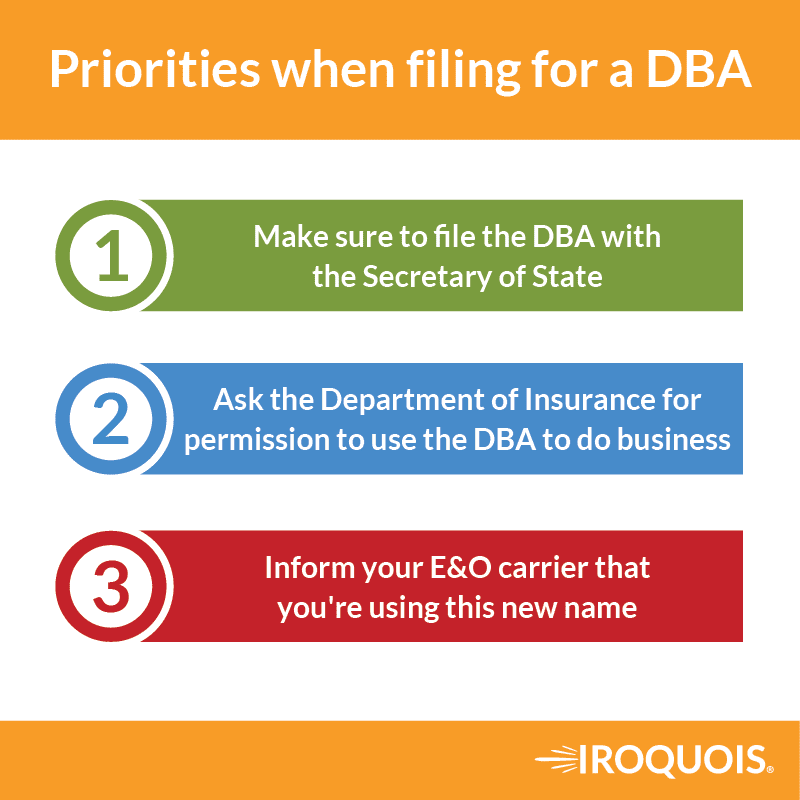Janine Fodor is the true definition of a trusted advisor. With decades of experience as a lawyer, Janine knows the ins and outs of the insurance industry. Today, she talks with our host Edwin K. Morris about DBA’s. The show covers what exactly a DBA is, why an insurance agent might need/want one, and lastly how to properly file for one. Janine gives listeners a checklist of three points to prioritize when looking to do business under a new name. Look through our catalog of episodes to find more like this from Janine.
Edwin K. Morris (3s):
Welcome to the trusted adviser podcast brought to you by Iroquois Group. Iroquois is your trusted advisor in all things insurance. I am Edwin K Morris. This podcast will involve general discussion of legal issues and concepts, and is for informational purposes only and does not contain or convey legal advice and does not create an attorney, client relationship. Your facts and circumstances may vary to determine your specific situation. You should consult your own legal counsel. Join me in welcoming back. Janine Fodor Janine serves as the Iroquois Group’s in-house counsel with almost a decade of experience at Iroquois Janine knows the ins and outs of the insurance industry.
Edwin K. Morris (48s):
Today, we review the ABCs of DBA’s. DBA’s, there’s lots of ways you can do business, but can you tell me what a DBA is and why do you need it?
Janine Fodor (59s):
The simplest way to describe a DBA is it’s a nickname for your business. So it is not your formal corporate entity name, but it is another name that you use in order to engage in business. Sometimes we will see states call this a DBA, doing business as name. Sometimes it will be referred to as a trade name or a fictitious name. Those are all synonyms for nicknames for your business.
Edwin K. Morris (1m 26s):
So in relationship to that concept in the world of people, they are also known as AKA. So this is similar to that. You’re just saying, Hey, we also use this name,
Janine Fodor (1m 39s):
Correct. And sometimes when someone is in business as a sole proprietor, that is, they are just engaging in their business as an individual. They haven’t formally created a corporation or an LLC. They might want to use a business name to engage in business, might want to have that business name on their cards or in any other marketing that they do rather than using their own individual name. So a DBA can be used in that context too. It can be your business name, you use as a sole proprietor, or it can be a second name that corporation or an LLC.
Edwin K. Morris (2m 13s):
I just want to clarify. So my understanding of sole proprietorship is its own legal formation. It’s no protection. There’s not really any protection there, but it is a way of doing business in a very simplistic way.
Janine Fodor (2m 27s):
Exactly correct? Yes. Yes. You can go into business as a sole proprietor. It would be a form of doing business.
Edwin K. Morris (2m 33s):
Yeah. And that’s something your attorney can work with on an estate and all that sort of thing. But a DBA is a little different than the sole proprietorship.
Janine Fodor (2m 42s):
Yes, a DBA is a name that you use, but if you went into business as a sole proprietor, so say for example, I decided to hang up a shingle and call myself, you know, Janine Fodor attorney at law. I could take an, a business name to say, you know, Olean attorney are Olean legal services, something like that. And that business name that I would use would be a DBA. My legal name would be Janine C Fodor, I’m a sole proprietor, but my business name would be Olean legal services.
Edwin K. Morris (3m 14s):
Interesting. So what’s the advantage?
Janine Fodor (3m 16s):
Well, I think that the primary reason that businesses take DBA’s at least right now in the insurance arena, is that there are a lot of acquisitions going on. So if you purchase a business that has been in operation in a town for a fairly long time, you know that Adam’s family insurance agency, everybody knows it. It’s been there for generations. You buy the Adams family insurance agency. You don’t want to change the name because that name has branding recognition and it has marketing appeal. And if you have another name, you’re the Smith insurance agency, Inc. And you want to continue to do business using the name of the business that you’ve acquired.
Janine Fodor (3m 57s):
That would be probably the most common reason that an insurance agency would take a DBA. And the second reason really is just that your, your formal name is long and complicated and people start to call you by sort of by a nickname. We have an agency we’re affiliated with called the Genesee valley agency. And everyone just started to call them GVA. And once everybody in their community was calling them GVA, they took GVA as a DBA because that allowed them to use that on letterhead and, and other ways, and to be recognized in the community, using that less formal name,
Edwin K. Morris (4m 33s):
Does the bank recognize that? Can you make out a check to GVA and they cash it? They’re like, yeah,
Janine Fodor (4m 38s):
That’s the really critical reason for having your DBA’s be recognized by the secretary of state and also by the insurance department. Because if people are starting to use that name to engage in business with you, then that name has to be tied in state records to your formal business name. And that’s the whole reason you want to register your DBA’s with your secretary of state or department of state. And most importantly, if you’re an insurance agency, have your name recognized and tied to your license by your state department of insurance
Edwin K. Morris (5m 17s):
In the creation of a company the initial step is you go to the state you’re in and see if that name’s already been taken, right? You have to go see if the license exists or the name exists that you can capture. Is this the same sequence of events for DBA’s in the state?
Janine Fodor (5m 33s):
Yes, you do have to make sure that the name is available and that involves doing typically a search on the corporate record base in the state where you want to file your DBA’s states vary a great deal. And the particular rules that they use to have an agency file a DBA’s with the state. So you would want to check with your particular state rules as a general matter. There’ll be some sort of form that you have to file with the secretary of state to request permission, to use the name. And you’re not going to get permission. If that name duplicates, another name that is being used in the state. So you’d want to do a name search before you made your request to use a particular name.
Janine Fodor (6m 16s):
If you’re going to use a name of an agency that you’ve just acquired, that you want to purchase the right to use that name, and you want to continue the branding and marketing advantages of using a known name, you’re likely to have to get permission from the former owner of the name. So they’re going to say, we’re about to dissolve our LLC or our corporation. We’ve sold to XYZ agency. We give them permission to use the name that will help you get past that search block, cause you’ll search for a name and it is in use because you just purchased it. You know, it was in use. That’s one way to sort of do a work around that problem is to get permission from the former owner.
Edwin K. Morris (6m 57s):
Is there any advice or constraints to having more than one DBA per organization?
Janine Fodor (7m 3s):
Again, the rules state by state might differ a little, but to the best of my knowledge, no, you are permitted to take multiple DBAs. And in fact, that is quite a common thing to do. And especially in this world where there’s been a lot of acquisitions, an agency that acquired a business in a certain territory might choose to use the former name in that territory and might choose to use a different name if they made a separate acquisition in another state or another county or city. So yes, it is possible to have multiple DBAs. You have to go through the same process every time and you have to make sure that those names are available and are not going to confuse the consumer if you use them.
Edwin K. Morris (7m 43s):
Also sounds like this could be considered a cashable asset, something that is in addition to an organization’s balance sheet, if you’re in the procurement of another agency, I would think you want to make sure the DBA’s included in that?
Janine Fodor (7m 59s):
Absolutely. When you are purchasing the assets of another agency, you would want to list amongst the assets, the rights to use the name because you’re you’re right. That is, it has intangible value. It can have quite a bit of intangible value. So if you are working on a sale of assets agreement, that would be something you would want to discuss with the seller and probably very likely something that you would want to purchase. You know, one of the most important things that I want to bring up here is that getting the secretary of state to approve a name is only the first step that almost all states there is a very important second step, which is to seek approval from the insurance department to use that name, to engage in the business of insurance.
Janine Fodor (8m 45s):
So it is a two step process. In some states, it’s a three-step process. You have to go to the insurance department, get preliminary clearance. It’s what you have to do in New York, then go to the secretary of state file your DBA’s formally with the secretary of state. And once you’ve got that formal filing, come back to the insurance department and get that name tied to your license because in the insurance world to engage in the business of insurance in any state, you’ve got to be a licensed entity. And when a consumer searches for your name in the department of insurance database, you want that name to show up as a licensed entity.
Janine Fodor (9m 25s):
And the insurance department is going to insist on it. If that’s on insurance documents like DEC pages or anything with which you are communicating with an insured. So you want to make sure the department of insurance in your home state and in any non-resident state where you’re doing business knows that you are engaging in the business of insurance using that nickname as well as your formal name, so that you don’t appear to a consumer or to a department of insurance regulator to be an unlicensed entity that will avoid a lot of problems. If you make sure the insurance department knows about your name and that your name is tied to your insurance license,
Edwin K. Morris (10m 7s):
Well what kind of timeline is this in this three-step process that you’ve mentioned
Janine Fodor (10m 13s):
A great deal is state by state. A lot of it is done electronically. Now, there is the potential for expedited proceedings, if you’re willing to pay a little bit of extra money, hopefully you should be able to do it in, you know, a couple of weeks. I would think things do get tied up. You’ve got to be willing to sort of follow through if you’re not getting a response in a timely manner, there are also, you can certainly use an attorney, but there are also a lot of services that will help you get DBA’s set up. Insurance departments I found are pretty responsive. If you pick up the phone and call them or email them, they want to help you out and make sure that your license is valid too. But yeah, I mean, I think that if you’re making an acquisition, you should probably plan ahead and expect to spend maybe up to a month, making sure that you have the right permissions to use the name that you might be acquiring
Edwin K. Morris (11m 3s):
Now seeing as these are state adjudicated state level monitored. I presume then it’s more complicated if you’re trying to use the DBA across state lines.
Janine Fodor (11m 14s):
Yes, that’s a very good point. Edwin, every state needs to separately give you permission to use your name. So if you are doing business in multiple states, you have to start with your home state. So wherever you’re incorporated and wherever your resident licenses, that’s the place to start. And then once you have that DBA’s established in your home state, you can request permission to use it in the other states where you’re foreign qualified. That is where you’re doing business as a non-resident and you should also apply to the departments of insurance in your non-resident states. If you’re using the name in that state. And again, there may be a limited geographical footprint where you expect to use a DBA.
Janine Fodor (11m 53s):
If geographical footprint extends across state lines, yes, you want to go to all the states where you might be using the name.
Edwin K. Morris (11m 59s):
Are there services that are available to help manage all of this?
Janine Fodor (12m 4s):
Yeah. There are services that will help you, so the same kinds of companies that will help you set up a corporation will usually have the documents or, or help you find the documents that you will need to file with your state. If you have a service of process company that you use, you know, they might be able to assist you or, you know, an internet search will, I think help you find services that can assist, and it’s not very detail oriented. You don’t want to make mistakes on your forms, but it’s not that difficult. It’s usually a fairly simple electronically fileable form. The most important thing is to do it, right? It’s the sort of thing that it’s not a high priority.
Janine Fodor (12m 44s):
It’s not very interesting task and it can get sort of put on the back burner in the list of things that you’re doing when you’re buying a business in. And there’s a lot of things that need to be done, but this is an important step.
Edwin K. Morris (12m 56s):
So I know a corporate structure, a corporate icon, a corporate name can be trademarked, can a DBA be trademark,
Janine Fodor (13m 3s):
It probably could be trademarked that’s sort of another step and probably a more expensive and involved one. It wouldn’t be necessary to trademark your DBA. If it became something that you use nationally and that your company was known by, you might want to look into getting a trademark. It’s not that it wouldn’t be possible to do that, but I think most people focus their trademark on their actual corporate name.
Edwin K. Morris (13m 28s):
Well, thanks for all the great information Janine. And before you head out on your next run, what’s the best advice you’d give somebody that is thinking of creating DBA’s.
Janine Fodor (13m 38s):
I would make yourself a checklist to do three things. One to make sure that you have filed the DBA’s and registered it with your secretary of state. Secondly, that you have asked the department of insurance for permission to use that name, to engage in business and third, that you’ve informed your errors & omissions carrier that you’re using that name just in case you ever get sued in that name. You want to make sure that you have coverage. So those are the three things I would put on a checklist and make that part of your acquisition process. If you are in engaged in the business of acquiring an agency and you want to make use of their names,
Edwin K. Morris (14m 18s):
That is extremely helpful as always Janine you’re here to help. Thank you very much for your time today.
Janine Fodor (14m 23s):
Great to talk to you again, have a good day.
Edwin K. Morris (14m 27s):
Thanks for listening to this edition of the Trusted Advisor podcast brought to you by Iroquois Group. Iroquois is your trusted advisor for all things, insurance, and remember get out of the office and sell. I am Edwin K Morris, and I invite you to join me for the next edition of the Trusted Advisor podcast.



